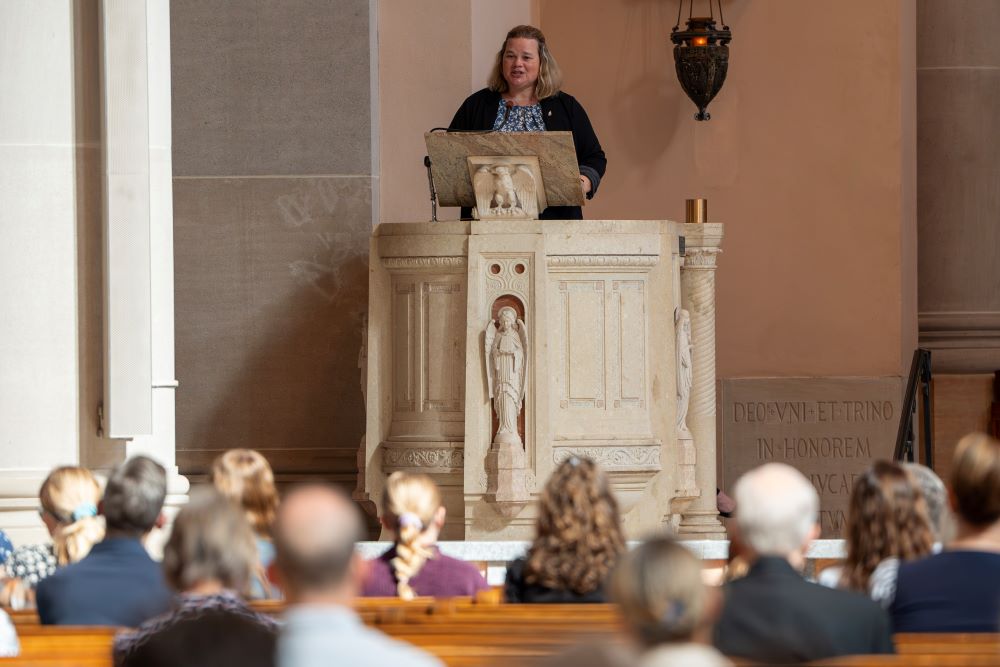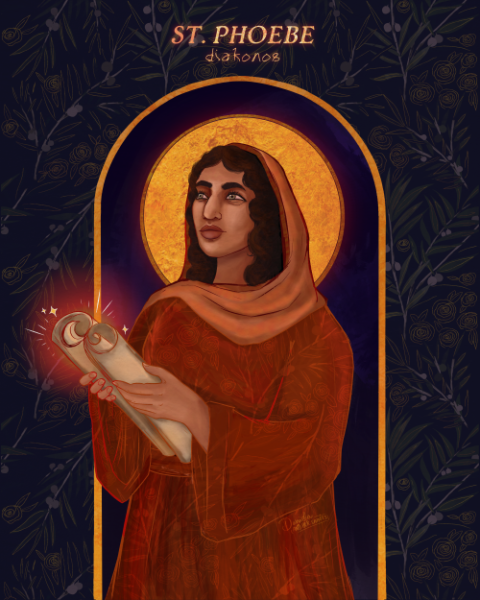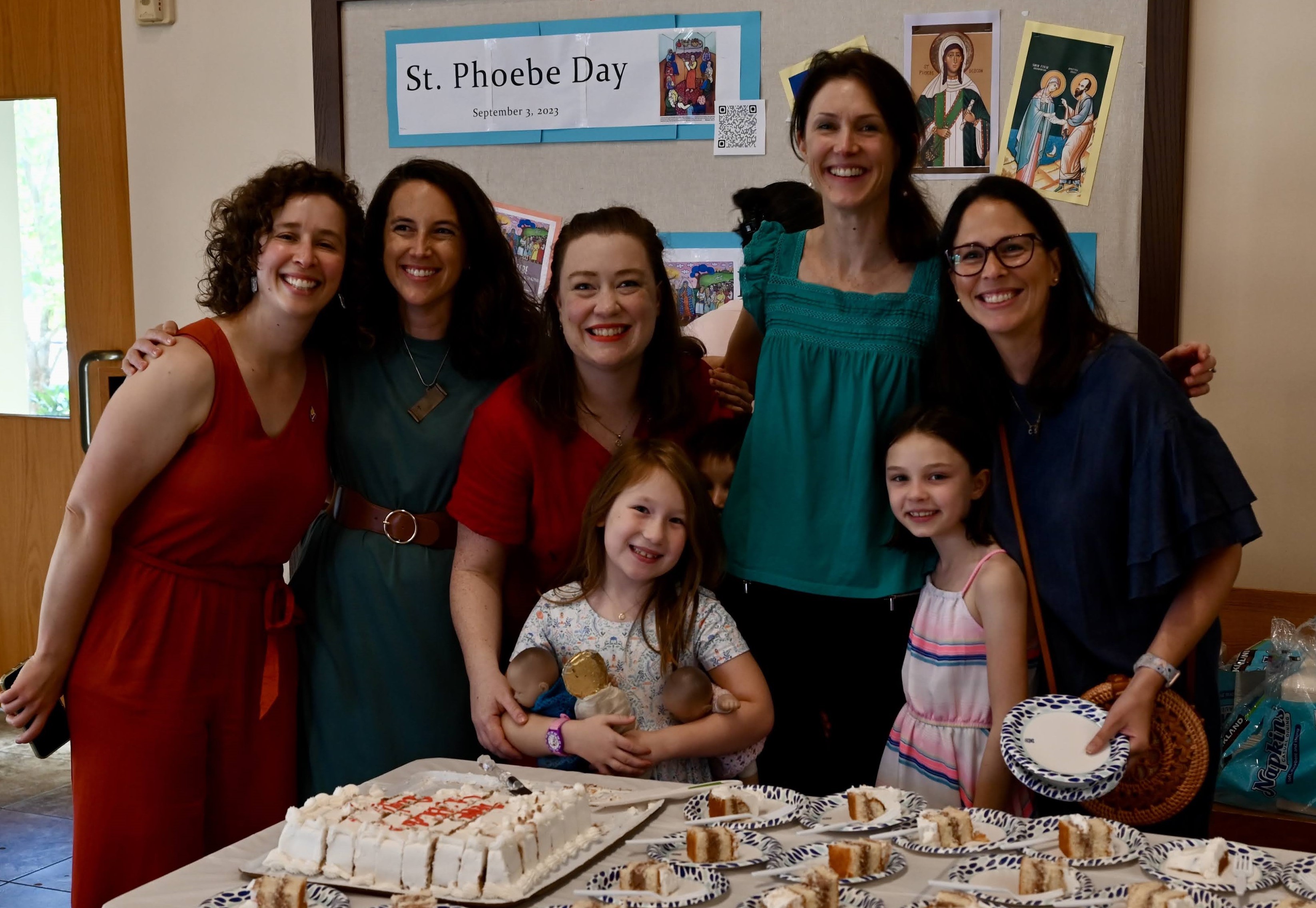
Rhonda Miska offers a Scripture reflection at St. Thomas More in St. Paul, Minnesota, during their September 2023 celebration of St. Phoebe. (Courtesy of Brennan Hall)
The discernment about women's participation in the church, particularly the discernment about restoring women to the diaconate, challenges even Pope Francis to follow the synodal process of listening for the will of the Holy Spirit.
I was particularly delighted that on Sept. 30 the pope received a group of women who minister to the people of God at the peripheries and share the dream of a prophetic, synodal diaconate. The women prayed with and for Pope Francis as the monthlong synod begins. With this meeting, my confidence grows that the pontiff keeps striving to model openness to encounter, listening and learning.
Throughout the synod on synodality, Discerning Deacons has been listening to the voices of the faithful and gathering data on what we are told. Synodal surveys garnered countless comments like these:
"The Spirit is calling us to bring the grace of the diaconate outside of the walls of the church: to hospital bedsides, to women's prisons, to the homes of mothers who have just given birth, to Catholic Worker Houses and soup kitchens. To be the face of Christ the servant."
"I believe the impact of women serving in the order of deacons would bind up wounds in the church. It would offer healing love to those who have been disenfranchised, including women. I feel called to be a part of the healing."

St. Phoebe Diakonos (Courtesy of And Her Saints)
But the synodal road has not always been a smooth one. As the church continues to voice a growing consensus for women in the diaconate, many clergy have adamantly blocked the path. That includes Pope Francis, who stunned many when he stated plainly in a CBS News interview that, no, a little girl growing up today could not dream of one day being ordained a deacon.
Why, one might ask, would such a statement be stunning? Is the exclusion of women from the sacrament of Holy Orders not a perennial part of the Catholic tradition? What could be more traditional than a pope shutting the door on the question of ordaining women as deacons?
Ordaining women as deacons, it turns out.
Women served as deacons from the church's earliest days, and when in the following centuries bishops began formally authorizing ministers by the laying of hands — ordaining them — they did so for women as well as men. Ordaining women as deacons as a permanent order is as much a part of the tradition as excluding them.
I've spent the last two years working full time with Discerning Deacons. While we're constantly up against those who would try to dismiss us as outsiders or intruders, quite the reverse is true. We seek to serve the discernment of our church about what it means to be the people of God in all that God calls a people to be. Part of this discernment is about whether God is calling for a return to the tradition of women in the diaconate. Insofar as we are advocating for something, it is that the church be true to its mission and embody that mission by taking up the discernment about women deacons in a genuinely synodal way.
The pope's CBS interview has cast a long shadow, triggering a latent clericalism that is fearful of communal discernment and open dialogue.
Meanwhile, at the Vatican, the processes surrounding the discernment about women deacons seem to grow more opaque by the day, having been excluded from the synod agenda and delegated to the only working group whose members’ names have not been disclosed.
"We don’t want to get ahead of the church."
I've heard these words time and again from clergy as justification for shutting down celebrations in honor of St. Phoebe and synodal conversations about women and the diaconate. This has been all the more true since Pope Francis’s interview.
I got a taste of this when, shortly after the pope's interview, I was scheduled to offer a Scripture reflection during Mass at a local parish. In keeping with ecclesial norms, the pastor gave the homily, and I spoke later in the Mass. As I was walking out after Mass, a parishioner waved me over and, referencing the interview, chastised me that the homily is reserved for those with Holy Orders.
Similarly, I've heard from people who organized celebrations in their parishes last September in honor of St. Phoebe, who this year had to trek across town to join other parishes’ St. Phoebe celebrations after their own pastors nixed their plans — often using Pope Francis' words as justification.

St. Phoebe, called a deacon by St. Paul in his letter to the Romans, is commemorated in the Roman Catholic tradition on Sept. 3. In celebrating her feast day, we are seeking to pray through the intercession of a woman that St. Paul commends as being "one of the saints." What could be more traditional than this?
And yet, in a parish that last year celebrated St. Phoebe with the installation of a new icon, written by a parishioner, the pastor felt he had to close the door on a 2024 celebration after the local bishop instructed him not to allow St. Phoebe celebrations this year. For now, the icon, a traditional depiction of a first-century saint, will remain off site.
What could be more traditional than a pope shutting the door on the question of ordaining women as deacons? Ordaining women as deacons, it turns out.
Elsewhere, a deacon suggested celebrating the feast day, eager to bring this little-known saint to the community he serves. His pastor told him no.
In one instance, a gifted liturgist and respected elder in her parish was uninvited from offering an educational presentation at a local deanery meeting on St. Phoebe and the synod's call for rethinking women's participation in the life and mission of the church.
"We don’t want to get ahead of the church."
Advertisement
The irony is, of course, that if anyone is getting ahead of the church on this issue, it was Pope Francis, whose "no" jumped ahead of the synod process. Is it getting ahead of the church to pray in community through a saint's intercession? Is it getting ahead of the church to tell the truth about its history, which includes hundreds, and perhaps even thousands, of women ordained as deacons throughout the first millennium? Is it getting ahead of the church to invite the people of God to discern about specific and concrete questions raised around the world in the synod, when the synod's guiding documents ask us to do just that?
Women and the diaconate cannot be the exception to synodality. As long as church leaders continue to treat it as such, they risk undermining the entire synodal project, the integrity of the church and the life of the people of God.





